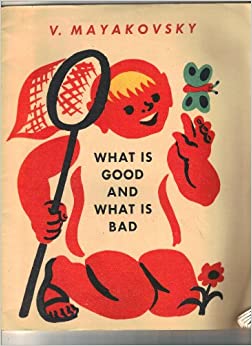
What Is Good And Bad Etiquette In Chess?
"Every Russian schoolboy knows" is a well-known cliche to say that a certain position or a concept is an integral part of a classical chess education. A good friend of mine, GM Alex Yermolinsky, even used this cliche as the title of his weekly show. Personally, I don't use this cliche much, but you can guess what I said when I learned that one of my students who was rated close to USCF 1800 didn't know the Philidor position in a rook endgame.
Today I want to discuss a new perspective on the "every Russian schoolboy knows" phrase. When I was a kid, I read the famous book by Vladimir Mayakovsky: "What Is Good And What Is Bad." Like millions of other Soviet children, I learned the basic concepts of good and bad behavior from this book. Wikipedia claims that "every language has a word expressing good in the sense of 'having the right or desirable quality' and bad in the sense 'undesirable.' A sense of moral judgment and a distinction between 'right and wrong, good and bad' are cultural universals."

Therefore, I am sure that you, my dear readers, had a similar book in your childhood which was sort of a moral compass to guide you through your life. When I started playing chess, I quickly learned certain rules of chess ethics which amounted to "what is good and what is bad" for chess players. For example, whenever we played a tournament, an official score-sheet where we notated the games had the following text: "There is no more shameful act for a chess player than a withdrawal from a tournament without a very serious reason."
As life goes on, modern society re-evaluates many classical rules and what was good some time ago becomes bad and vice versa. We see similar changes in chess. Look at any major open tournament in the US, and you'll see that dozens of participants don't play the last round and withdraw just because they lost any chances to win a prize. I am not blaming them, just stating facts. After all, the score-sheet from my childhood mentioned "a very serious reason," so maybe that was their case?
Now let's take a look at this recent game:

For 32 moves, two super grandmasters played an endgame of K+R vs. K+R. Don't get me wrong. I see people playing this endgame on a more or less regular basis. Whenever I watch any major scholastic tournament, I always see this kind of endgame in the U1000 section. Still, I cannot imagine Tarrasch playing it against Rubinstein or Geller against Keres. I bet Grischuk and Giri would have kept playing with king against king at the end if not for the stupid software that ends the game automatically due to insufficient material. It is a shame since it would have vindicated the old joke of GM Eduard Gufeld. He was watching two kids playing bullet, which was a very new kind of a time control then. Disgusted by the quality of the game, the grandmaster asked, "Why don't you simply put two kings on the board and move them back and forth until one of you loses on time?"
By the way, it is not my intention to criticize GM Alexander Grischuk. After all, why should we single him out? Look for example at the following game:
His opponent, another super-grandmaster kept playing a basic endgame down a rook and three pawns. Many "old school" chess players would consider such a behavior insulting. Yet, GM Karjakin managed to save the game and win a big real estate prize.

As you can see, these days "what is good and what is bad" for chess players is completely different compared to a bygone era. In 1990, I played a blitz tournament in Moscow's famous hotel Kosmos. The prizes paid in Deutsche Marks were quite big by the Soviet standards. In the last round of the preliminary group, I was playing Mikhail Tal. Since I was a half-point behind, I had to win the game in order to qualify to the final stage. I played White and miraculously managed to outplay the Magician in my favorite English opening. At the end, it was a completely winning endgame for me since I was about to promote my g7-pawn to a queen. I had about 30 seconds on my clock, but since I was much younger and faster than today, the result of the game was quite clear. So, I grabbed the g7-pawn to promote it. I vividly remember what happened next. Since it was very hot inside the hotel due to a large crowd of people and also because I was very nervous at the end of the game. (Come on; wouldn't you be nervous when you are about to beat Mikhail Tal?) My hands got very sweaty. So, when I grabbed the g7-pawn to promote it, the treacherous pawn slipped away through my fingers. I grabbed the pawn again, but it kept slipping through my fingers. I tried to promote the pawn three times all in vain, while my seconds were ticking away! Then I decided to use both of my hands to finally promote the stupid pawn. When I was about to make another attempt to get myself a new queen and was reaching for that evil g7-pawn, Tal suddenly intercepted my hand and shook it. I didn't even realize right away that he resigned. How many of the modern elite players would resign seeing the struggling opponent's seconds melting away? By the way, it wasn't the only example of Tal's noble behavior. In the 1970s, he played the Women's World Champion GM Nona Gaprindashvili in a blitz tournament. When Gaprindashvili got really low on time, Tal a couple of times "forgot" to press the clock after making his move. When Gaprindashvili noticed Tal's "mistake," she whispered, "If you do that again, I'll resign straight away!"
But maybe that was just Tal. After all, I heard many people called him "an alien" since he was so different from other people. Meanwhile, we see numerous examples where modern super-grandmasters have played "dead-drawn" endgames in order to flag the opponent. In some cases, they succeed!
So, should you play this kind of a position and try to flag your opponent? I don't know. We live in a turbulent time in which morals and ethics are changing. What was inappropriate 30-40 years ago is mainstream now. So, let's do a little poll: Were the old-school players right, or do the modern elite players know better? Please share your opinions in the comments!



